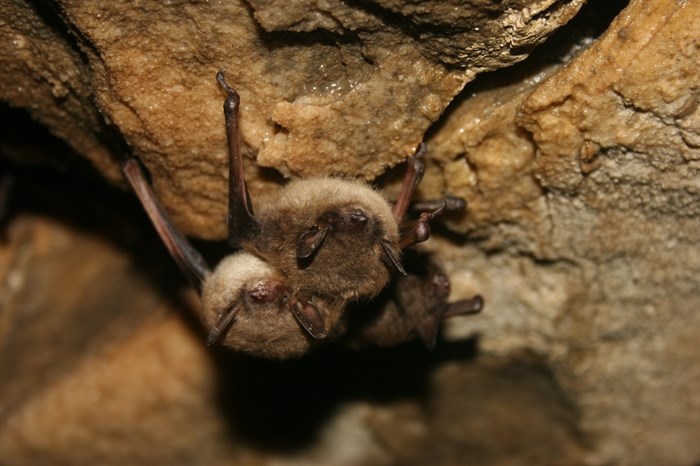
Little Brown Myotis are a species at risk of contracting deadly White Nose Syndrome. In the winter these bats can be found hibernating in caves, mines, and rock crevices.
Image Credit: SUBMITTED/ BC Community Bat Program
February 08, 2024 - 2:30 PM
White-nose syndrome has devastated North American bat populations outside of BC and biologists are concerned the disease’s spread is imminent.
Last year, the fungus that causes the fatal disease was found for the first time in the province in Grand Forks.
“Across North America, millions of bats have been killed, and seven of our 15 BC species could be severely affected by the disease,” Paula Rodriguez de la Vega, Okanagan coordinator for the BC Community Bat Program, said in a press release, Feb. 7.
The disease has no cure, although several promising treatments are being developed.
It's also possible to mitigate the effects of the disease.
This winter and spring, the province and the BC Community Bat Program are asking the public to report bat activity or any sick or dead bats found before May 31.
“Increasing the number of bat reports from the public is the best chance to understand how the disease might spread and affect local bat populations,” Rodriguez de la Vega said.
The fungus associated with the syndrome attacks bats while they are hibernating. It grows on their faces, giving them a white nose.
The fungus disturbs bats while they are resting and forces them to wake up and clean their faces. In the process, the bats waste valuable energy and will eventually die from starvation.
Fortunately, the fungus doesn't cause disease in humans and pets.
“The bats of BC are key predators of many night-flying insects. They are essential parts of BC’s ecosystems and provide a huge economic benefit by helping control agricultural, forest, and urban pests,” Rodriguez de la Vega said.
Two species of bats, the Little Brown Myotis and the Northern Myotis, are listed as endangered in Canada because of the syndrome.
Reports of dead bats, or sightings of winter bat activity, can be reported to the BC Community Bat Program on its website here, by email here, or by calling 1-855-922-2287 ext.13.
To contact a reporter for this story, email Georgina Whitehouse or call 250-864-7494 or email the editor. You can also submit photos, videos or news tips to the newsroom and be entered to win a monthly prize draw.
We welcome your comments and opinions on our stories but play nice. We won't censor or delete comments unless they contain off-topic statements or links, unnecessary vulgarity, false facts, spam or obviously fake profiles. If you have any concerns about what you see in comments, email the editor in the link above. SUBSCRIBE to our awesome newsletter here.
News from © iNFOnews, 2024